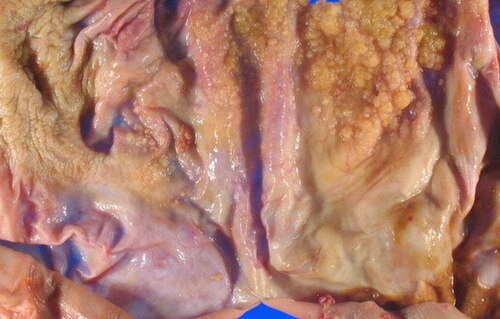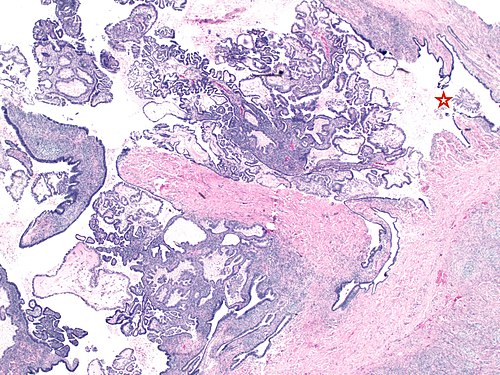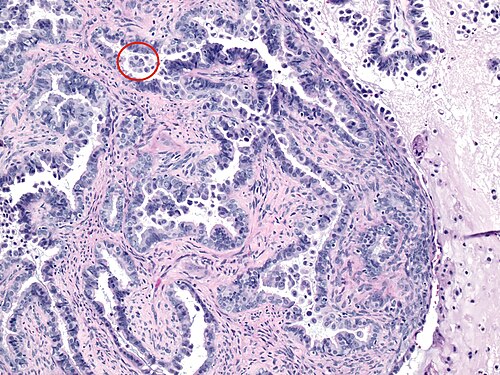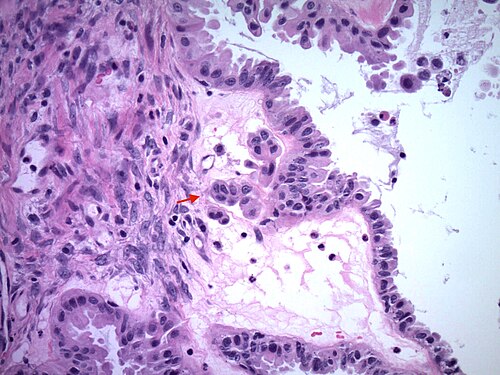Difference between revisions of "Case 112"
| (4 intermediate revisions by the same user not shown) | |||
| Line 3: | Line 3: | ||
===Site=== | ===Site=== | ||
Left ovary | |||
===Primary image=== | ===Primary image=== | ||
[[Image: Gross of borderline serous tumor of the ovary 01.jpg|500px|link=|center|]] | [[Image: Gross of borderline serous tumor of the ovary 01.jpg|500px|link=|center|]] | ||
<center>Gross image.</center> | |||
<br> | |||
[[Image: Low maginification of borderline serous tumor of the ovary.jpg|500px|link=|center|]] | |||
<center>Low magnification. [[H&E stain]].</center> | <center>Low magnification. [[H&E stain]].</center> | ||
{{hidden|High magnification|[[Image: Intermediate magnification of a borderline serous tumor showing eosiniophilic cells.jpg |500px|link=|center|]] | {{hidden|High magnification|[[Image: Intermediate magnification of a borderline serous tumor showing eosiniophilic cells.jpg |500px|link=|center|]] | ||
<center>High magnification. [[H&E stain]].</center>}} | <center>High magnification. [[H&E stain]].</center>}} | ||
{{hidden|High magnification|[[Image: Microinvasion in a borderline serous tumor of the ovary.jpg |500px|link=|center|]] | {{hidden|High magnification|[[Image: Microinvasion in a borderline serous tumor of the ovary.jpg |500px|link=|center|]] | ||
<center>High magnification. [[H&E stain]].</center>}} | <center>High magnification. [[H&E stain]].</center>}} | ||
===Differential diagnosis=== | ===Differential diagnosis=== | ||
| Line 275: | Line 273: | ||
===Diagnosis=== | ===Diagnosis=== | ||
{{hidden|Diagnosis|<center>[[serous borderline tumour of the ovary|BORDERLINE SEROUS TUMOR OF THE OVARY]] WITH MICROINVASION.</center> | {{hidden|Diagnosis|<center>[[serous borderline tumour of the ovary|BORDERLINE SEROUS TUMOR OF THE OVARY]] WITH MICROINVASION.</center> | ||
<br>The characteristic feature of borderline serous tumor is the hierarchical branching of the papillae, where the papillae progressively branch from larger ones to smaller one and finally into tufts of epithelial cells. The cells show only mild to moderate atypia. A cytadenofibroma may have similar proliferation, but by convention should be less than 5% of the tumor. Focal mucinous change may also occur. Papillary clear cell carcinoma simulating borderline tumor will show a WT1-ve, ER-ve, PR-ve immunoprofile in contrast to the positive profile of the serous tumor. Often clusters of cells with abundant eosinophilic cytoplasm are seen at the surface of papillae (star, image 2; oval image 3) or in lymphatic like spaces either as single cells or small papillary clusters. This theoretically represents microinvasion which is variably defined by different authors (<3 or 5 mm or | <br>The characteristic feature of borderline serous tumor is the hierarchical branching of the papillae, where the papillae progressively branch from larger ones to smaller one and finally into tufts of epithelial cells. The cells show only mild to moderate atypia. A cytadenofibroma may have similar proliferation, but by convention should be less than 5% of the tumor. Focal mucinous change may also occur. Papillary clear cell carcinoma simulating borderline tumor will show a WT1-ve, ER-ve, PR-ve immunoprofile in contrast to the positive profile of the serous tumor. Often clusters of cells with abundant eosinophilic cytoplasm are seen at the surface of papillae (star, image 2; oval image 3) or in lymphatic like spaces either as single cells or small papillary clusters. This theoretically represents microinvasion which is variably defined by different authors (<3 or 5 mm or 10mm<sup>2</sup>). However, recent evidence suggests that the two patterns of invasion have vastly different prognosis. The AEC (abundant eosinophilic cells) are [[p16]] positive and reflect a terminally differentiated senescent phenotype. If invasion is exclusively composed of this cell type, then these do not portend a poor prognosis.<ref name=pmid24441661>{{Cite journal | last1 = Maniar | first1 = KP. | last2 = Wang | first2 = Y. | last3 = Visvanathan | first3 = K. | last4 = Shih | first4 = IeM. | last5 = Kurman | first5 = RJ. | title = Evaluation of microinvasion and lymph node involvement in ovarian serous borderline/atypical proliferative serous tumors: a morphologic and immunohistochemical analysis of 37 cases. | journal = Am J Surg Pathol | volume = 38 | issue = 6 | pages = 743-55 | month = Jun | year = 2014 | doi = 10.1097/PAS.0000000000000155 | PMID = 24441661 }}</ref> These cells are significantly more often seen in BRAF mutated tumors, and are perhaps associated with a better prognosis.<ref name=pmid25188864>{{Cite journal | last1 = Zeppernick | first1 = F. | last2 = Ardighieri | first2 = L. | last3 = Hannibal | first3 = CG. | last4 = Vang | first4 = R. | last5 = Junge | first5 = J. | last6 = Kjaer | first6 = SK. | last7 = Zhang | first7 = R. | last8 = Kurman | first8 = RJ. | last9 = Shih | first9 = IeM. | title = BRAF mutation is associated with a specific cell type with features suggestive of senescence in ovarian serous borderline (atypical proliferative) tumors. | journal = Am J Surg Pathol | volume = 38 | issue = 12 | pages = 1603-11 | month = Dec | year = 2014 | doi = 10.1097/PAS.0000000000000313 | PMID = 25188864 }}</ref> | ||
====References==== | ====References==== | ||
| Line 290: | Line 288: | ||
[[Category:Cases]] | [[Category:Cases]] | ||
[[Category:Cases in | [[Category:Cases in gynecologic pathology]] | ||
- | [[Category:Cases in gynecologic pathology - junior]] | ||
[[Category:Cases difficulty 2]] <!-- difficulty 1-7 -- should roughly correspond to the PGY level --> | [[Category:Cases difficulty 2]] <!-- difficulty 1-7 -- should roughly correspond to the PGY level --> | ||
Latest revision as of 05:07, 29 September 2015
Provided clinical history
42 year old woman with a 9 cm ovarian mass
Site
Left ovary
Primary image


High magnification
|
|---|
 |
High magnification
|
|---|
 |
Differential diagnosis
Differential diagnosis
|
|---|
|
|
Additional tests
More history
More history
|
|---|
|
|
Ask a colleague
Ask a colleague
|
|---|
|
|
Stains
|
|
|
|
|
|
|---|
IHC
|
|
|
|
|
|
|---|
Molecular testing
Chromosomal translocations
|
|
|
|
|---|
Other molecular tests
|
|
|
|
|---|
Diagnosis
Diagnosis
|
|---|
|
References
|